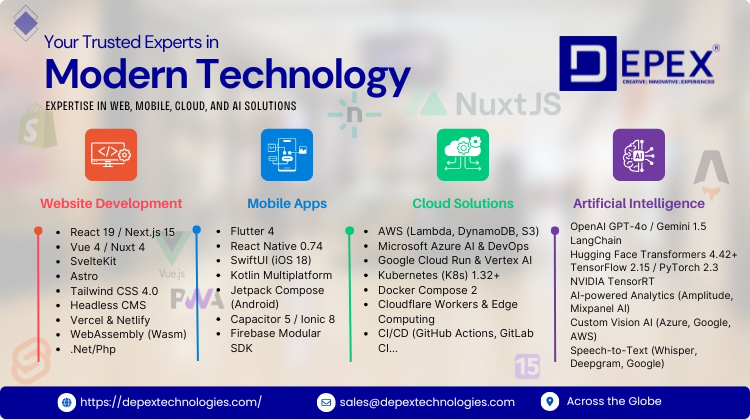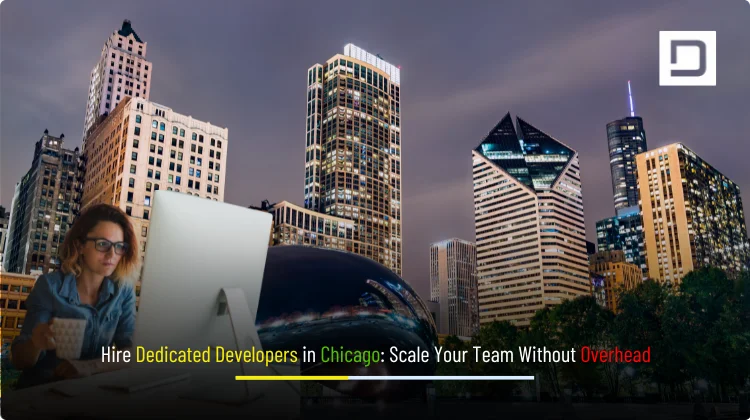Hire Dedicated Developers in Chicago: Scale Your Team Without Overhead
When you are racing to ship features in a competitive market like Chicago, the right talent model is everything. If you are searching to Hire Dedicated Developers in Chicago or to Hire Developers in Chicago without the pains of permanent payroll, facilities, and long recruitment cycles, this guide is for you. Below, you will learn exactly how the dedicated-team model works, why Chicago companies across fintech, healthcare, logistics, and retail love it, and how Depex Technologies makes scaling up (and down) simple, compliant, and cost-effective while keeping quality high and velocity steady.
Why Chicago Is the Right Place to Expand Engineering Capacity
Chicago isn’t just a hub for finance and trading. It’s a diversified tech market where healthcare systems, insurance carriers, logistics providers, e-commerce brands, media companies, and civic tech teams are all building software. That breadth creates a constant need for engineering capacity yet full-time hiring can be slow, expensive, and inflexible. Teams must balance:
- Seasonal or project-based spikes in workload
- Hard-to-find niche skills (data engineering, DevOps, AI/ML, React Native, .NET, Laravel, Python, Go)
- Budget constraints, especially in uncertain economic cycles
- Compliance, security, and reliability requirements common to regulated sectors
A Dedicated Developers model solves these pain points. You get a vetted, embedded team that behaves like your own staff, but with none of the overhead of hiring, training, and retaining every role in-house.
What “Dedicated Developers” Actually Means
At Depex, a dedicated team is a long-lived, embedded extension of your engineering org. Embedded engineers align to your roadmap, sprint cadence, and toolchain, then join daily standups as part of your flow. Reporting rolls up to your product managers, and all work happens in your repos, boards, and CI/CD. On top of that, Depex brings delivery governance so while the team feels “yours” day to day, you still gain the rigor of our process discipline and playbooks.
Key attributes:
- Exclusive capacity: Your team’s time is reserved for your backlog.
- Skill-matched personnel: We assemble the right mix of developers, QA, DevOps, UI/UX, data analysts, or solution architects.
- Scalable headcount: Expand or contract in weeks, not quarters.
- Cost visibility: A predictable monthly rate with no hidden costs.
- Process consistency: Agile ceremonies, code reviews, automated testing, and measurable delivery health.
Put simply: you gain flexible velocity without growing fixed overhead.
Why Chicago Teams Choose Dedicated Developers Over Traditional Hiring
Speed to impact. Recruiting in a hot market takes months. A dedicated squad can start in days or weeks with battle-tested patterns for onboarding and delivery.
Lower total cost of ownership (TCO). Fully loaded FTE costs exceed base salaries (benefits, office costs, tools, attrition, and idle time). A dedicated model collapses those line items into one transparent monthly fee.
Access to hard-to-hire skills. Need a short, intense burst of React + Node + GraphQL + Kubernetes? Or a short-term push for Salesforce integrations, .NET modernization, or AI-assisted customer support? A flexible team gives you niche skills when you need them.
Less risk, better governance. With Depex, you get SLAs, delivery management, and a replacement guarantee. Holidays, attrition, and coverage gaps no longer stall your sprints.
Better focus for your core staff. Internal engineering leaders can focus on architecture, security, and product strategy, while a dedicated team executes well-scoped initiatives fast.
When the Dedicated Model Is the Best Fit
You should Hire Dedicated Developers in Chicago when:
- You have a clear backlog with an ambitious delivery timeline.
- You’re building a new product line while keeping the core app stable.
- You’re migrating from a monolith to services and need parallel stream capacity.
- You’ve raised a new round and must accelerate roadmap delivery without long recruitment cycles.
- You’re a Chicago enterprise modernizing legacy stacks under strict compliance.
The dedicated approach shines for product increments, platform modernization, integrations, data pipelines, and CX enhancements.
Engagement Options: Full-Time Pod, Part-Time Stream, or Hourly SWAT
Full-Time Pod (most popular).
A stable, multi-disciplinary pod (e.g., 4–8 engineers plus QA and DevOps) embedded in your org. Ideal for feature roadmaps, platform refactors, or long-running initiatives.
Part-Time Stream.
A small squad that shares time across multiple initiatives, perfect for maintenance, bug-fix sprints, low-volume data tasks, or steady-state enhancements after a big launch.
Hourly SWAT.
Specialists who jump in to solve specific bottlenecks: performance tuning, security hardening, cloud cost optimization, or a tough migration.
No matter which you choose, you can scale up or down with minimal friction.
Roles You Can Add to Your Chicago Team
- Frontend Developers: React, Next.js, Vue, Angular responsive, accessible, performant interfaces.
- Backend Developers: Node, .NET, Java, Python, Go APIs, services, queues, event-driven systems.
- Mobile Developers: React Native, Flutter, Swift, Kotlin consumer and enterprise apps.
- Data & AI: Data engineers, ML engineers, analytics specialists pipelines, feature stores, model ops.
- DevOps & Cloud: Kubernetes, Terraform, GitHub Actions, GitLab CI, Azure DevOps, AWS/GCP/Azure.
- QA & Automation: Test strategy, Selenium, Playwright, API and performance testing.
- UI/UX: Research, wireframes, design systems, accessibility audits.
- Solution Architects & Tech Leads: Roadmapping, system design, security reviews.

Delivery Without Overhead: How Depex Makes It Work
1) Discovery & Scope Alignment
First, structured discovery workshops clarify business goals, target users, constraints, and KPIs. Next, your existing repos, pipelines, and documentation undergo a thorough review. In parallel, our team maps dependencies and integrations, then aligns on compliance requirements typical of Chicago’s finance, healthcare, and logistics sectors.
2) Team Assembly
You interview shortlisted engineers. We finalize the pod composition and define sprint-ready outcomes. We also nominate a Delivery Lead who keeps cadence and quality on track.
3) Secure Onboarding
We adopt your identity and access policies: SSO, least-privilege roles, environment segregation, and secrets management. We pass your vendor security checklist and align on incident protocols.
4) Velocity Ramps Up
The team commits to an initial sprint plan, sets up dashboards, and starts delivering small but visible increments. We prioritize “early wins” that demonstrate value within the first two sprints.
5) Continuous Governance
You get weekly delivery reports, burn-down charts, DORA-style metrics, risk registers, and release notes. If priorities shift, we re-plan without drama.
6) Scale and Optimize
Need two more React devs? A dedicated data engineer for a new pipeline? We scale the pod while keeping context intact. When demand tapers, we right-size without layoffs or sunk costs on your side.
Tooling, Time Zones, and Collaboration
Your Depex team works the way your Chicago team works:
- Boards & Docs: Jira, Linear, Azure Boards, Notion, Confluence.
- Communication: Slack, Teams, email with agreed response windows.
- Code & CI/CD: GitHub, GitLab, Bitbucket, GitHub Actions, Azure DevOps, CircleCI.
- Quality & Observability: SonarQube, Snyk, OWASP checks, Cypress/Playwright, Postman, Datadog, New Relic, Grafana.
To keep collaboration smooth across time zones, we set core overlap hours with Chicago (CST/CDT) for standups, backlog grooming, and demos. Asynchronous work fills the rest, with clear acceptance criteria and definition of done.

Security, Compliance, and Vendor Management
Chicago companies often operate under strict obligations. Depex aligns with:
- Data protection: Role-based access, encrypted secrets, masked logs, and environment isolation.
- SDLC controls: Branch protections, required reviews, static analysis, dependency scanning, and artifact signing.
- Incident response: Escalation runbooks, status pages, and RTO/RPO expectations.
- Regulatory awareness: HIPAA-style safeguards for PHI workflows, PCI-minded patterns for payment features, SOC-friendly change controls, and audit-ready documentation.
We’ll work within your vendor security framework and complete assessments as part of onboarding.
Sample TCO: Dedicated Developers vs Traditional Hiring in Chicago
Let’s walk through a simplified example. Numbers will vary by role, but the structure holds.
Traditional hiring for a 6-person feature team (annualized):
- 1 Tech Lead, 3 Full-Stack Devs, 1 QA, 1 DevOps Engineer
- Fully loaded cost often exceeds base salaries by 30–50% once benefits, taxes, office, licenses, recruiting fees, and attrition risk are included.
- Typical annual total can easily cross $1.2M–$1.6M for senior-leaning teams in a major U.S. market.
Dedicated team through Depex (12 months, all-in):
- Comparable squad with fixed monthly rate, flexible scaling, and guaranteed continuity.
- No recruiting fees, reduced idle risk, simplified vendor management.
- Depending on seniority mix and scope, many clients realize 30–50% savings year-over-year while maintaining or improving throughput.
Just as important, you launch faster. Time saved on hiring translates to earlier revenue, better customer retention, and fewer opportunity costs.
How We Structure Work So You See Value Quickly
Roadmap to Releases: We break initiatives into release trains with shippable increments every two to six weeks.
Quality by Design: Testing is integrated from day one. We use automated checks and rigorous code reviews.
Security from the Start: Threat modeling and dependency hygiene keep vulnerabilities out of production.
Observability for Learning: Dashboards make performance and errors visible so we can iterate rapidly.
Stakeholder Confidence: Regular demos show progress, validate assumptions, and de-risk surprises.
Chicago-Relevant Use Cases We Deliver
Fintech & Trading Adjacent:
Low-latency services, market data integrations, portfolio dashboards, and internal tooling hardened for scale.
Healthcare & Insurtech:
Patient portals, claims automation, eligibility checks, appointment scheduling, and data pipelines with PHI safeguards.
Logistics & Supply Chain:
Warehouse management features, route optimization, carrier APIs, barcode/RFID integrations, and analytics.
Retail & eCommerce:
Composable storefronts, OMS/WMS integrations, payment orchestration, and customer analytics with privacy in mind.
SaaS & Platforms:
Multi-tenant architectures, billing and entitlement, SSO/SAML, and usage-based pricing engines.
In each case, a Dedicated Developers model accelerates delivery while you keep the strategic levers in-house.
What You Can Expect in the First 30–60–90 Days
1–30 Days:
- Access, toolchain alignment, environment setup
- Architecture and backlog review
- First sprint complete with small production win
- Delivery dashboards live
31–60 Days:
- Velocity stabilizes, QA automation baseline set
- Two to three releases shipped
- Technical debt log and modernization plan in place
61–90 Days:
- Predictable cadence, deeper performance work
- Cross-functional improvements (DevOps, security, analytics)
- Roadmap confidence and stakeholder trust solidified
Onboarding Checklist (Short, Actionable, and Effective)
- Confirm roles, responsibilities, and escalation paths
- Grant repo, environment, and documentation access
- Share coding standards, review guidelines, and branching model
- Define acceptance criteria and Definition of Done
- Set sprint duration, ceremonies, and release cadence
- Establish performance and quality KPIs
- Align on incident response and maintenance windows
This checklist keeps the team productive from day one and reduces operational friction.
How We Keep Quality High Without Slowing You Down
- Design reviews for architecture and component boundaries
- Pair programming on complex modules to transfer knowledge
- Automated tests at unit, API, and UI layers where ROI is strongest
- Static analysis for code health and maintainability
- Performance budgets for frontends and services
- Retro-driven improvements each sprint
You’ll see fewer regressions, faster recoveries, and better user experiences.
Frequently Asked Questions
Q1: Can we interview and approve every developer?
Yes. You select the final team. If a profile doesn’t fit, we replace quickly—no awkwardness.
Q2: How do you protect our IP?
We sign robust NDAs and MSAs. Code resides in your repos. Access follows least-privilege policies, and all work is logged.
Q3: Can you work with our Chicago-based vendors and in-house staff?
Absolutely. Your Depex pod integrates into your ceremonies and collaborates across time zones with defined overlap for standups and planning.
Q4: Will you help us optimize cloud costs and performance?
Yes. Our DevOps and platform engineers regularly reduce spend, tune autoscaling, cache hot paths, and improve CI/CD throughput.
Q5: What if our priorities change mid-engagement?
We re-plan. The dedicated model is built to absorb change. You won’t be stuck with an inflexible statement of work.
Q6: How do we measure success?
Together we define KPIs: lead time, deployment frequency, change failure rate, recovery time, story points delivered, defect density, and NPS from your internal stakeholders.
A Day in the Life: What Working With Depex Feels Like
By 9:30 AM Chicago time, your Slack has a concise standup summary: what shipped, what’s next, and any blockers. Your Delivery Lead posts a Jira snapshot and a link to a short demo clip for yesterday’s completed user story. Developers push code behind feature flags, and QA automation runs cleanly in CI. In the afternoon, you jump into a 25-minute backlog refinement. Risk items are flagged early—no surprises on Friday. By week’s end, the release is green, the dashboard shows improved API p95 latency, and marketing has a new UI for the campaign landing flow—already A/B test-ready. That rhythm compounds into momentum.
How to Get Started (and See Results in Weeks, Not Months)
- Share your goals. Tell us which outcomes matter: faster releases, lower costs, better reliability, or a new product line.
- Meet your shortlists. Interview our recommended developers and finalize the pod mix.
- Kick off with a two-sprint plan. Prioritize early wins and visible milestones.
- Review and adjust. Inspect metrics after Sprint 2. Scale up if needed; streamline if not.
You retain control. We provide the horsepower.
Conclusion: Scale With Confidence Without the Overhead
If your Chicago roadmap demands speed, quality, and fiscal discipline, Hire Dedicated Developers in Chicago with Depex Technologies. You will expand capacity without adding permanent overhead, move faster without sacrificing governance, and ship with a level of reliability that keeps customers happy. Whether you’re modernizing a core platform, launching a new mobile experience, building data pipelines, or layering AI into customer journeys, our embedded teams deliver outcomes safely and predictably.

Ready to scale your team without overhead?
Depex Technologies can assemble a dedicated, Chicago-aligned pod that executes your plan, integrates with your culture, and accelerates ROI. Let’s plan your first two sprints and put early wins in production.
About Depex Technologies
Depex is an AI-First engineering partner trusted by startups and enterprises across the globe. We deliver end-to-end software development, platform modernization, data engineering, DevOps, QA automation, and UI/UX. Our model combines embedded teams with strong delivery governance, giving you speed and control without the hiring drag.






